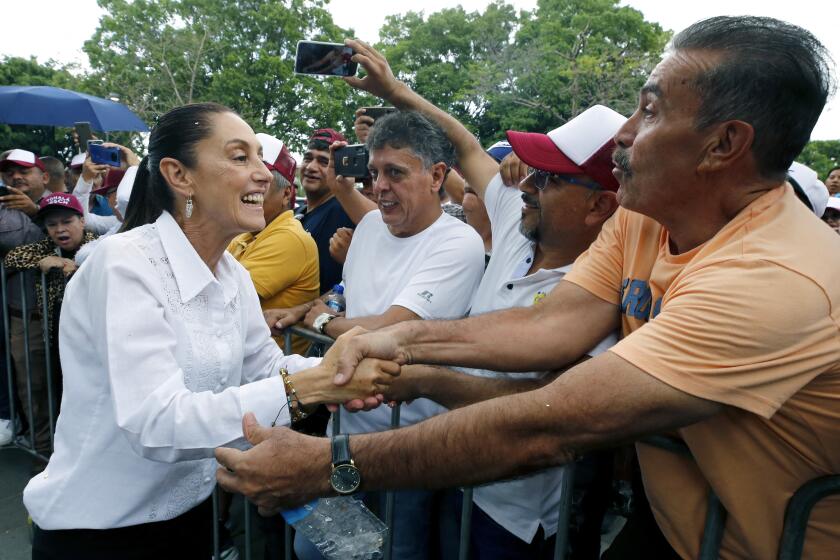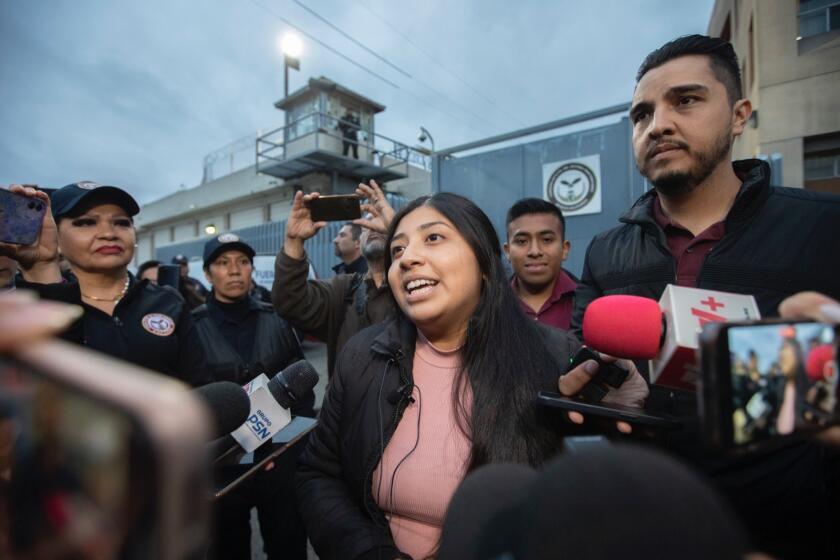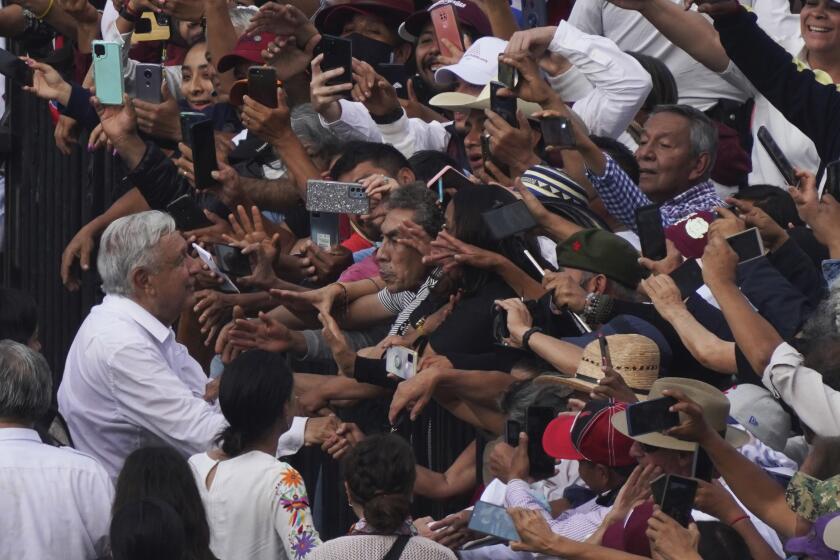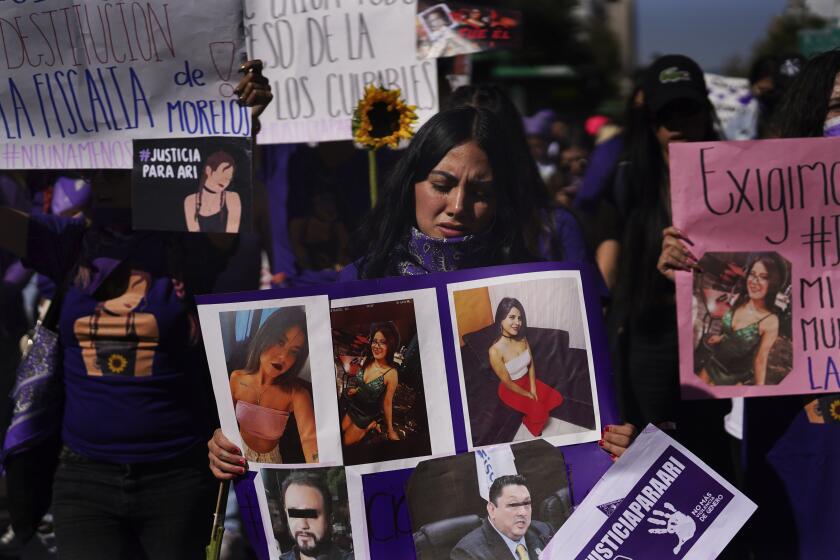Mexico’s opposition coalition picks Xóchitl Gálvez as its 2024 presidential candidate
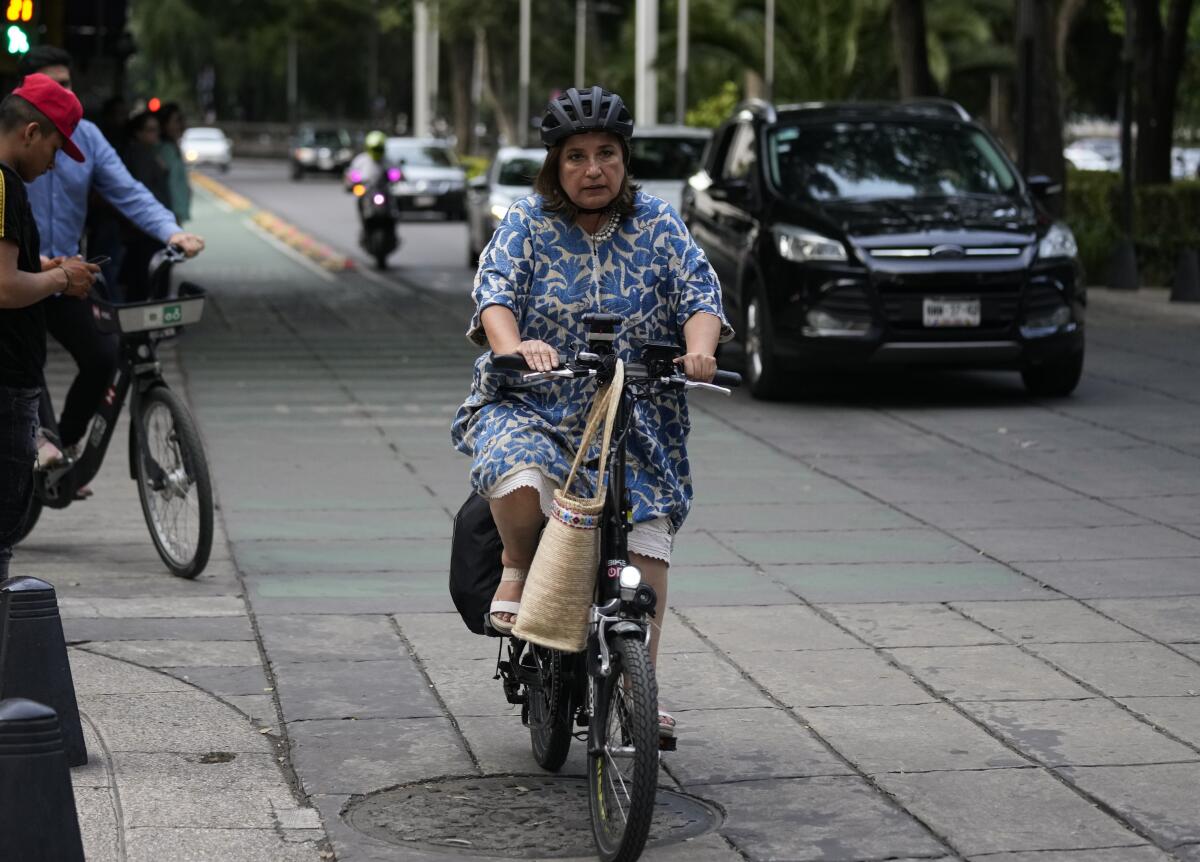
- Share via
MEXICO CITY — Mexico’s opposition coalition announced Thursday it has chosen Sen. Xóchitl Gálvez as its candidate in next year’s presidential election.
The de facto nomination — which will be formalized when candidates are registered — suggests that Mexico’s next president will probably be a woman, as former Mexico City Mayor Claudia Sheinbaum leads most polls in the primary race for President Andrés Manuel López Obrador’s Morena party.
Mexico has never had a female president, though several women have run. The opposition coalition, known as the Broad Front for Mexico, and Morena are by far the biggest political forces in Mexico.
Gálvez is a former street-food salesgirl who became a tech entrepreneur and senator. Though she caucuses with the conservative National Action Party in the Senate, she is not a member of the party and has the kind of folksy, plainspoken style popularized by López Obrador.
Mexico election: The two women frontrunners in the race for president both invoke gender and a cracking glass ceiling. So why are some feminists skeptical?
The election is June 2, and López Obrador will leave office on Sept. 30, 2024. He retains high approval ratings but cannot run for reelection, as Mexican presidents are limited to a single term.
Although she has gained ground, Gálvez remains a long shot against López Obrador’s Morena, which holds a majority in Congress and governs 22 of Mexico’s 32 states.
Arturo Sánchez Gutiérrez, a member of the coalition’s selection committee, said Gálvez was the winner of the polls that were part of the process to determine the nomination.
Mexico City Mayor Claudia Sheinbaum aims to succeed President Andrés Manuel López Obrador, and shares his policies, ideology and even speech patterns.
“Today we know that the Broad Front for Mexico coalition will be led by Sen. Xóchitl Gálvez Ruiz,” said Sánchez Gutiérrez.
The coalition had planned to hold a public vote on the nomination Sunday but canceled it after the only other remaining contender, also a woman, essentially dropped out of the race after Gálvez swept most polls.
Gálvez will face one of six contenders who are competing for the Morena nomination. Morena will decide its nominee based on a series of opinion polls, and the winner is expected to be announced Sept. 6.
A Tijuana police officer imprisoned for killing her cop boyfriend shows how Mexico — struggling with femicides — reacts when a woman kills her abuser.
Sheinbaum is the favorite in Morena’s primary race, but former Foreign Secretary Marcelo Ebrard is also in the running.
Gálvez faces obstacles, including López Obrador’s popularity and his avowed willingness to break a long tradition in Mexican politics and actively use his presidency to campaign against her.
Despite spiraling violence and a stagnating economy, Mexican President Andrés Manuel López Obrador has maintained sky-high approval ratings because he speaks to the working poor.
López Obrador has used tax information to accuse Gálvez of insider dealing in government contracts, something she denies, noting that the López Obrador administration has contracted services from her companies.
Courts and electoral authorities have warned López Obrador against using government airtime and resources to attack Gálvez.
But Gálvez also faces challenges in her own coalition, a mishmash of conservative, centrist and progressive forces united only by their opposition to López Obrador.
The institution that helped foster Mexico’s democracy is under attack by President Andrés Manuel López Obrador.
The coalition is made up of the conservative National Action Party, known as PAN; the small progressive Democratic Revolution Party; and the old-guard Institutional Revolutionary Party, or PRI, which held Mexico’s presidency without interruption between 1929 and 2000.
As a girl, Gálvez, 60, helped her family by selling tamales on the street. She grew up poor in the central state of Hidalgo, and her father was an Indigenous Otomi schoolteacher. She learned to speak his native Ñähñu language as a child, and holds her Indigenous roots close. She favors wearing the loose embroidered Indigenous blouse known as a huipil.
A free-spirited political independent who often travels the sprawling capital on bicycle, Gálvez is known for cracking occasional off-color jokes. She entered the Senate chamber in December dressed up as a dinosaur, an allusion to party leaders known for their archaic, unmovable practices.
Next year’s election is López Obrador’s chance to show whether he has built a political movement that can outlast his charismatic leadership. His successor will have to tackle persistently high levels of violence, heavily armed drug cartels and migration across the nearly 2,000-mile border with the United States.
The gruesome killing of Ariadna López shocked Mexico, spurred protests in the capital and highlighted the nation’s epidemic of violence against women.
Mexico City arrests Uriel Carmona, Morelos state’s chief prosecutor, charging him with obstructing the investigation into Ariadna López’s death.
More to Read
Sign up for Essential California
The most important California stories and recommendations in your inbox every morning.
You may occasionally receive promotional content from the Los Angeles Times.
